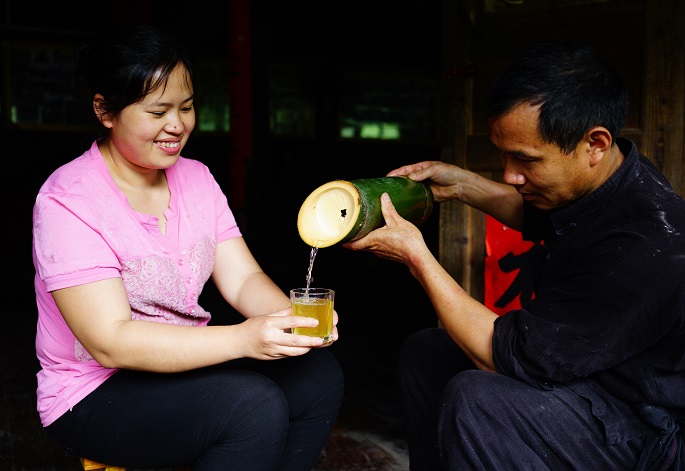Homemade wine adds flavor to life of farmers across China
Published : 05 Jun 2018, 12:15
Growing rice has never been a profitable business for the residents of Zhangdun Village, in a remote mountainous region of southeast China's Fujian Province.
With 50 kg of rice selling at 12 yuan (about 1.8 U.S. dollars), and pork costing 4 yuan per kg, most families in the once-impoverished village could barely afford to eat meat once a week, recalled Lin Qixing, the village Party chief.
Transportation infrastructure was inadequate until roads to the isolated village were finally paved in recent years. But Lin decided to make a change to the traditional practise of growing rice three decades ago, and thanks to his hard work all 893 residents were officially lifted out of poverty in 2017.
Nestled in mountains, nearly half of the village's cultivated land, or 500 mu (about 33 hectares), has been turned into vineyards.
With clusters of unripe grapes wrapped in white paper bags, farmers
fasten the openings of the bags with twist ties around the stems of the vines.
The process, known as bagging, protects the fruit from pests, diseases, and bad weather.
Since the vineyards were developed under Lin's guidance in 1990s, he encouraged villagers to produce homemade wine as it had a longer shelf life and was easier to transport than fresh grapes.
In Zhangdun, wine is produced the old-fashioned way. Ripe grapes are removed from stems, cleaned, and crushed by hand before being placed in huge wine barrels.
This organic homemade wine has helped all households in the village lift themselves out of poverty, as tourists discovered the mountainous village and its local wine.
In the early years of growing grapes, farmers gave away wine to their friends, and invited people nearby to pick grapes in their vineyards. With more and more tourists coming, villagers realized that they could use wine to turn the once-isolated village into a tourist destination.
In 2012, the village established a cooperative to facilitate communication between winemakers and to set up guidelines for the winemaking process and ensure food safety standards.
Since then, wine produced in the village has been packaged and branded under the trademark "Zhangdun," selling at 20 yuan per liter.
The village produces an average of 150,000 liters of wine a year. The production peaked in 2015 at 225,000 liters of wine.
Lin said middle class urban residents want organic food and this provides a good market for Zhangdun wine.
The homemade wine is pasteurized and bottled for sale or stored in barrels for aging to improve the flavor.
Zhangdun Village received around 100,000 tourists last year, which helped bring in a total revenue of more than 1.5 million yuan for its 260 households mainly from wine and food sales.
Villager Wu Xiufeng recalled that when he first started growing grapes, he could not even afford to buy vines at 1 yuan each. Lin gave him some vines and allowed him to pay for them at a later time.
Wu's family now earns more than 100,000 yuan a year, more than five times their annual income in 1996.
Lin said after the vines started producing fruit, winegrowers found the grapes often rotted on the vines before the harvest. He turned to books to find a solution, and discovered the answer: fruit bagging.
"Grapes have developed our hometown from a poor village into a rich one," said Lin. "Farmers can now start their own businesses and afford a better education for their children."
In the 1980s, it was rare for a villager like Lin to have graduated high school, but today almost all young people in the village receive either a higher vocational or junior college education, and six villagers even have master's degrees.
"As villagers acquire more knowledge and have the money to travel, they broaden their horizons and are more motivated to make Zhangdun even better," Lin said.


